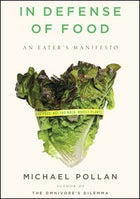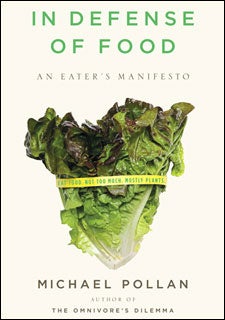The Omnivore’s Dilemma, Michael Pollan’s astonishing look at where our food comes from, received near-universal acclaim in 2006. But while the book laid out what’s wrong with the average American diet, it left many bewildered about what, and how, we should eat. With his follow-up, In Defense of Food: An Eater’s Manifesto (The Penguin Press, $22), Pollan gives it to us straight: “Eat food. Not too much. Mostly plants.” You’ll be healthier, happier, and you’ll do more to help the planet.
In Defense of Food by Michael Pollan
 Buy at Amazon.
Buy at Amazon.Much of the nutritional advice of the past half-century, he arguesÔÇöeat margarine, not butter; dial back the carbsÔÇöhas made us fatter and sicker. He fingers the food industry, hell-bent on selling us “enhanced” food products, and slams the reductionist science of nutritionists, who focus on individual nutrients but ignore the benefits of foods considered as a whole. He also blames journalists, who uncritically report the latest, often contradictory nutritional studies, and the government, whose diet guidelines are influenced by political pressure. “As eaters,” Pollan writes, “we find ourselves increasingly in the grip of a Nutritional Industrial Complex.”
Pollan recaps some of OmnivoreÔÇöthe industrialization of food, the phenomenon of the overfed, undernourished AmericanÔÇöbut his focus is on prescriptions. “Avoid food products containing ingredients that are a) unfamiliar, b) unpronounceable, c) more than five in number, or that include d) high-fructose corn syrup,” he advises. “Eat more like the French. Or the Italians. Or the Japanese.” By letting culture and tradition be your guide, you’ll quit agonizing over nutrients and spend more time in the produce aisle and in your kitchen. “When you cook at home,” he writes, “you seldom find yourself reaching for the ethoxylated diglycerides.” You’ll also take far greater pleasure in eating.
Not everyone will like Pollan’s approach, especially if they’re time-stressed or poor. But spend more on good food, he insists, and your health-care costs will drop. If you can pay for cable TV, why not carrots?
In Defense of Food isn’t as rich a meal as OmnivoreÔÇöthere’s no gagging on the gut pile or gunning for wild boar. It’s more of a multivitaminÔÇöscholarly, fearless, and funnyÔÇöand for that, it goes down easy.


